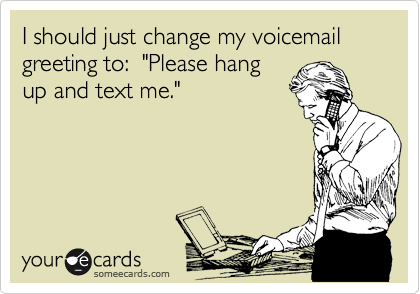 I recently led two corporate training sessions for millennial professionals struggling to engage with their Gen X and baby boomer colleagues. While we discussed several macro issues – such as the millennials’ desire for more feedback and training – we also dealt with some of the small issues that cause friction between the generations.
I recently led two corporate training sessions for millennial professionals struggling to engage with their Gen X and baby boomer colleagues. While we discussed several macro issues – such as the millennials’ desire for more feedback and training – we also dealt with some of the small issues that cause friction between the generations.
The biggest of the small generational challenges was definitely voice mail. For the vast majority of millennials, voice mail is outdated, annoying, pointless and unbearably slow. But many people still consider it a vital business tool.
In the past I used to point out to young professionals that there are instances in which voice mail can be a useful communication choice, such as when someone can’t reach you and doesn’t want to leave a record of their words in a written email, too.
Their response to my logic: “Yeah, but companies monitor voice mail, too.”
True.
Or, I would suggest to millennials, it could feel easier for members of older generations to express tone or subtlety with their voices rather than the written word.
Their reply: “But I use Google Voice to translate my voice mails into emails or texts, so I don’t hear their actual voices anyway.”
Oh.
And in my final attempt to defend voice mail (perhaps because I’m old enough to remember how exciting it was to get voice mail in the first place, rather than an answering machine that could only be checked when I was at home and required the annoyance of rewinding and fast forwarding), I would say that people used voice mail to give their messages a more personal touch.
And they said: “But for me a text feels more personal. That’s what I use with my friends and family.”
Good point.
Millennials Are Leading the Demise of Voice Mail
As you can imagine, I’ve stopped trying to defend voice mail to millennials. But, as in my training sessions this past week, the topic prompts a valuable discussion about how the workplace will change when millennials comprise the majority of the workplace (a tipping point projected to take place around 2020). Will landline phones disappear next? Or perhaps email, replaced by a combination of texts, IM, wikis and social networks? No matter what, voice mail is clearly on the chopping block.
In fact, some forward-thinking organizations have already ditched it. Coca-Cola recently became the largest company yet to drop its voice mail system, calling the move a way “to simplify the way we work and increase productivity” at its Atlanta headquarters.
I also interpret the move as a way to signify to younger workers that Coke “gets it” and wants to be an employer of choice for millennials (as Bloomberg points out, it wasn’t a cost-saving strategy; the company estimated the savings at only about $100,000 a year).
Other generations at Coca-Cola were pleased as well. According to the company, it gave workers the option to retain their voice mail and only six percent of employees opted to keep it. That means a lot of boomers and Xers dislike voice mail, too.
One of the things I say often is that millennials want what members of other generations want in the workplace – they are just more willing to ask for what they desire and leave if they don’t get it. Add “the death of voice mail” to that growing list.
How do you feel about voice mail and the future of work? Please share in the comments!

